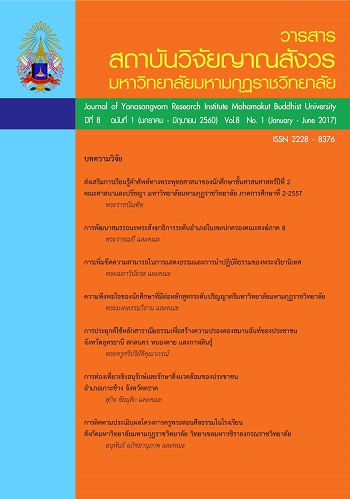A COMPARATIVE OF THE GOVERNMENT VIEW IN TAO TEH CHING SCRIPTURE AND THE TIPITAKA SCRIPTURE
Main Article Content
Abstract
The objectives of this thesis aimed at studying the government according to Tao Teh Ching scripture and Tipitaka Scripture and comparing the government viewpoint between Tao Teh Ching Scripture and Tipitaka Scripture. The research results found as follows: 1. The government viewpoint in Tao Teh Ching Scripture makes a focus in terms of evolution, the caste division and the benefits. The state that was compared to a big family means the state virtually governs people and makes a change by beginning from itself. The governor who has morality will not govern more with his subjects. The subjects who are under the governor should follow the good morality: honesty and gratitude. The morality is very important for administration. Being in a moral is better than laws because the moral grows up in humanities; there is no need in the alphabets. 2. The government viewpoint in Tipitaka, according to the Lord Buddha, he makes a focus on the government as mediator or organization to make peace in society.. It means that the state plays a big role and the governor should be in a moral. The morality is very important and fulfills the humanities in the right behavior and there are finally no need laws. 3. The analytical result in comparison between Tao and Buddhism both agreed with terms of evolution of nature and society. The state was organized because of social needs and welfares. There are 2 viewpoints in government as law and morality which protect the people from doing a bad behavior or a mistake, not for punishment. Both Lao Tzu and Lord Buddha pay attention in a morality more than in a law. Again, Lao Tzu was not only an official in the Royal Scribe at Loyan City but he was also a philosopher. His viewed on politics and government independently through the poems. In the same way, the Lord Buddha was the prophet; his viewed through religion by teachings. However, Lao Tzu and Lord Buddha both had the same goal for seeing the people to get good welfares but there were a few differences in Tao concerning to a mundane happiness but in Buddhism concerning to the supramundane happiness.
Article Details
References
มหาจุฬาลงกรณราชวิทยาลัย. พระไตรปิฎก ภาษาไทย ฉบับมหาจุฬาลงกรณราชวิทยาลัย. กรุงเทพมหานคร : มหาจุฬาลงกรณราชวิทยาลัย, 2539.
นายชลธี ยังตรง. “ความคิดทางการเมืองของพุทธทาสภิกขุ”. วิทยานิพนธ์ปริญญารัฐศาสตรมหาบัณฑิต สาขาการปกครอง. บัณฑิตวิทยาลัย : จุฬาลงกรณ์มหาวิทยาลัย, 2533.


